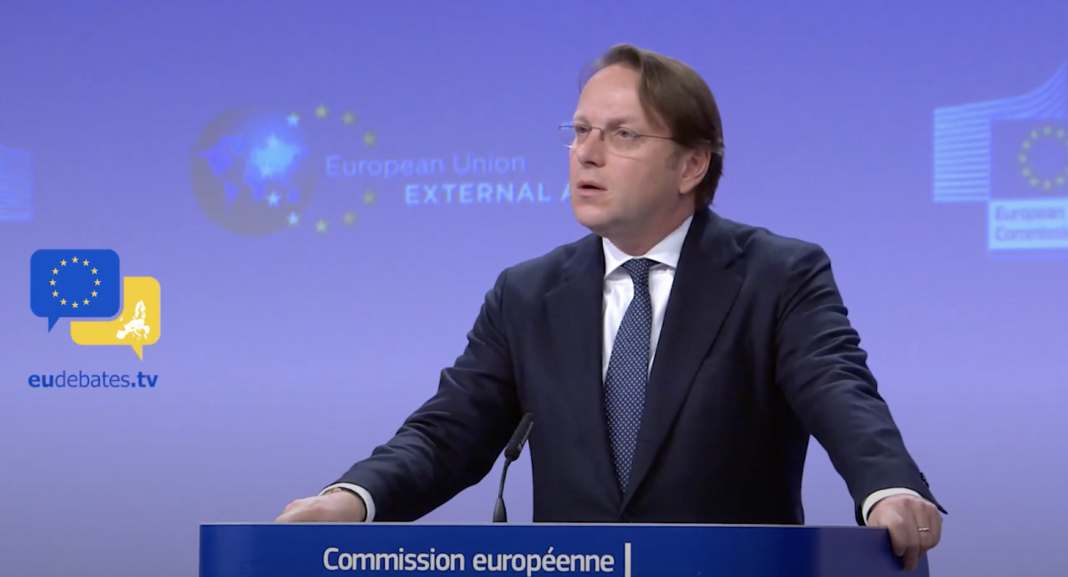The European Commission and the High Representative for EU’s foreign and security policy presented on Wednesday their joint report on the state of play of EU – Turkey relations with proposals for bridging the differences between them in a number of political issues that have soured their relations and derailed Turkey’s path to EU membership.
December 1, 2023, European Commission.
The report was requested by the European Council at its meeting in June and the Council will also have the final say on how to act on it. The report is also linked to Sweden’s NATO application which has not yet been ratified by Turkey and Hungary. Council President Charles Michel referred to the report in his meeting with Turkey’s President Erdogan when meeting him at the NATO Summit in Vilnius in July.
Discussing Sweden’s accession to NATO, “also in view of improved relations with Turkey”, he twitted that they had explored opportunities to bring cooperation back to the forefront and “re-energize our relations.” The report was expected to deal with EU’s relations with Turkey in a “strategic & forward-looking manner”.
Josep Borrell, the High Representative, said at the press conference presenting the report that the EU retains a strategic interest in a stable and secure environment in the Eastern Mediterranean Sea and in the development of a cooperative and mutually beneficial relationship with Turkey.
He pointed out Turkey has shown a more constructive attitude on various issues since the Council in 2018 noted that the accession negotiations had “effectively come to a standstill.”. The standstill in the accession process is due to Turkey’s backsliding on core EU principles and values during the Turkish president’s authoritarian rule.
On the positive side, Borrell highlighted Turkey’s role in facilitating the Black Sea grain deal with Ukraine and Russia. On the other hand, Turkey’s non- implementation of the EU restrictive measures against Russia, while intensifying trade and economic ties with Moscow, poses serious risks of circumvention of the measures. Implementing the sanctions is of paramount importance, he stressed.
Disagreements on foreign policy
The Turkish stance on Sweden’s accession to NATO is also seen negatively by the EU although the Commission continues to regard the issue as a bilateral Swedish-Turkish issue. Turkey is currently clearly at odds with EU priorities under the EU Common Foreign and Security Policy (CFSP), maintaining a very low alignment rate of on average 10%, according to the report.
The Cyprus settlement issue is core element of Turkey’s strong disagreements with the EU in the Eastern Mediterranean. The situation in Cyprus continued to deteriorate due to the consistent efforts of Turkey and the Turkish Cypriot leadership to undermine the basis of the settlement of the Cyprus issue enshrined in the UN framework (a bi-communal and bi-zonal federation), the EU report says. For the Guterres framework for a solution, click here.
Turkey’s stance on the Cyprus issue and its vocal promotion of a “two state solution” for the island constitute a major challenge. Its support to and use of military means in regional conflicts, e.g. in Syria, and its views on Hamas are also at odds with EU positions. Turkey’s foreign policies are far from aligned with EU’s common foreign and security policy (CFSP), a condition for accession.
While the EU in the Israeli-Palestinian conflict appreciates Turkey’s support to the two -state solution in this conflict, the report underlines that Turkey’s position on Hamas is in complete disagreement with the EU common position. Turkey not only refrained from condemning Hamas terrorist attack on Israel on 7 October and qualifying it as terrorism but also spoke out in support of Hamas.
As regards Syria, the reports states that Turkey is an important factor in the country with a significant military presence in the northern parts of the country. EU shares Turkey’s view of PKK as a terrorist organization but did not mention YPG, the Syrian-Kurdish militia which played a important role in the coalition against the Islamic State.

